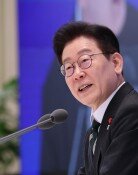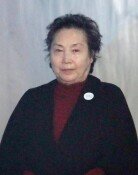Korea to Spend at Least 3.606 Trillion Won
Korea to Spend at Least 3.606 Trillion Won
Posted September. 21, 2005 07:22,
Direct Sending of Electricity to North Korea, New Light-water Reactor and Energy Supply-
Estimation of minimum costs based on government data shows that it would take 3.606 trillion won to provide energy to North Korea in a variety of ways.
More specifically, sending electricity to the North costs a total of 1.72 trillion won when choosing to install electricity conversion facilities between the two Koreas. That amount includes one trillion won for equipment preventing reverse flow of electricity and electricity conversion facilities, 600 billion won for power transmission lines between Yangju, Gyeonggi Province and Pyongyang, and 120 billion won for installing two 345kV electricity conversion facilities.
It is still difficult to calculate specific costs from building a third light-water reactor according to the agreement from the six-party talks and assisting in energy (heavy oil) supply. But an estimated 636 billion won will be needed when considering costs of constructing the Shinpo light-water reactor with the 1994 Geneva Convention as the standard. That amount is required when the five parties of six-party talks, excluding North Korea, evenly share the costs with the $4.6 billion needed for building the Shinpo light-water reactor as the standard.
A high-ranking government official said with regard to the cost of the light-water reactor supply, The government believes that it cannot be excluded, considering the nuclear energy business and integration of the two Koreas and the fact that the light-water reactor will be constructed on the Korean peninsula.
Apart from that, the government is also expected to lose 1.2 trillion won that it spent on the Shinpo light-water reactor and bear the cost of the reward that the North is to demand, if the Korean Peninsula Energy Development Organization (KEDO) declares official completion of the Shinpo light-water reactor project of which construction is suspended.
How Much Will the Actual Cost Be?-
In practice, there is a strong possibility that Korea will bear a larger burden than the U.S., China, Japan, and Russia not only in power transmission that the government said it would push forward independently but also the light-water reactor and heavy oil supply.
In theory, it is equitable that the five countries of six-party talks, excluding North Korea, evenly bear the cost. In practice, however, it is expected that South Korea, which is directly concerned with the Norths nuclear issue and which shares the same people with the North, will be demanded to pay more. In the case of the Shinpo light-water reactor, Seoul decided to bear 70 percent of the construction costs.
In this regard, it is projected that how the government persuades the public and induces an agreement will be the issue after the proportion of cost-bearing for building a light-water reactor and supplying heavy oil is decided through the fifth round of six-party talks scheduled to be resumed in November.
Kim Woo-sang, professor of political science and diplomacy at Yonsei University, pointed out, There is a need for an efficient explanation that a peaceful settlement of the North Korean nuclear problem is the first consideration for establishing peace on the Korean peninsula and that the issue is the most important for the future of Korea.
Seo Chang-rok, professor of Graduate School of International Studies at Korea University, also predicted, It is true that the government has a stronger voice than in the Geneva Convention in which it bore 70 percent of the costs and had no say. But it is inevitable that we bear larger amount of costs compare with other parties in the talks in that this is an issue about the Korean peninsula.
A government official said, As light-water reactor supply is an issue to be discussed after a considerable period of time, there is no need to talk intensely about costs at the moment, adding, Interest from peace resulting from the North Koreas dismantlement of nuclear weapons program should be also taken into consideration.
taewon_ha@donga.com



![[속보]한덕수 1심 징역 23년 선고…“내란 가담자 중벌 불가피”](https://dimg.donga.com/c/138/175/90/1/wps/NEWS/IMAGE/2026/01/21/133201789.1.jpg)


![[속보]한덕수 1심 징역 23년 선고…“내란 가담자 중벌 불가피”](https://dimg.donga.com/c/138/175/90/1/wps/NEWS/IMAGE/2026/01/21/133202388.1.jpg)
